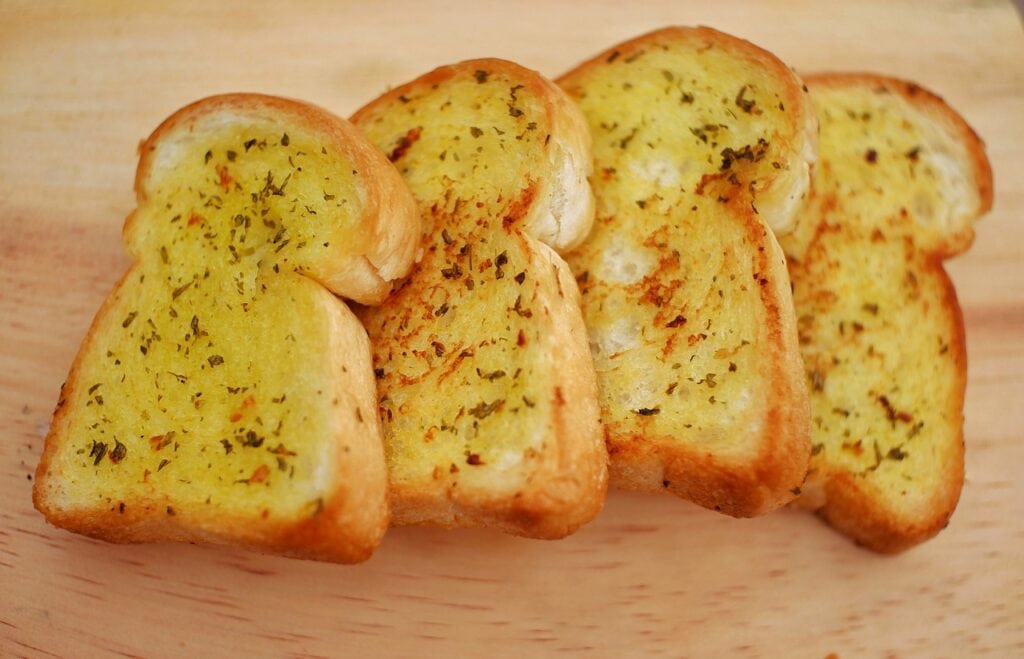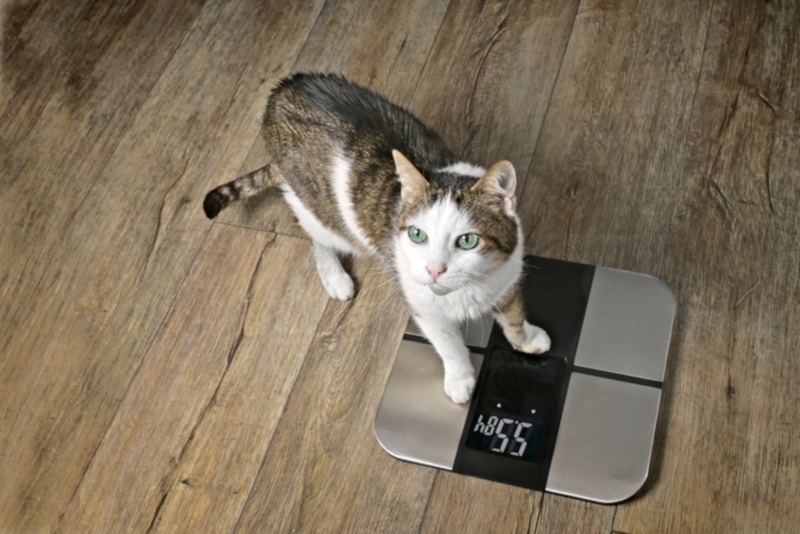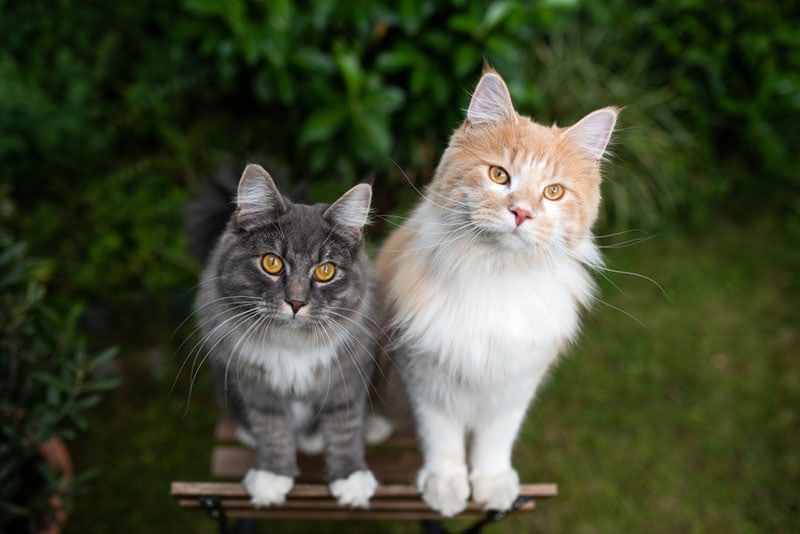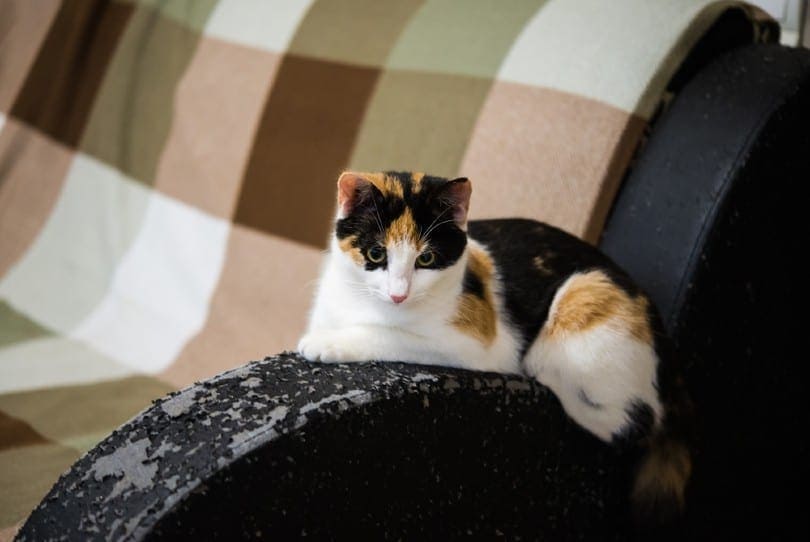Can Cats Eat Garlic Bread? Vet Approved Facts & FAQ
Updated on

Some cats are finicky when it comes to what they eat, while others will scarf down almost anything that they find on the kitchen floor.
If you’ve caught your cat eating your garlic bread and are wondering if this is okay, the short answer is absolutely not! Nothing in garlic bread is good for cats, and garlic itself is toxic. It can make cats ill, and if enough is consumed, it can be fatal.
Let’s go over the ingredients in garlic bread and discuss why it’s bad for cats and what you should do if your cat has eaten some.
Why Is Garlic Bread Bad for Cats?
The garlic is the biggest problem for cats in garlic bread, but the other ingredients aren’t all that great either. Here’s a breakdown of each ingredient so you can have a better understanding of why cats shouldn’t have access to garlic bread.
Garlic
You can’t have garlic bread without the garlic, and garlic is quite toxic to cats. Garlic comes from the Allium genus, which includes onions, chives, and leeks, but garlic is about five times more potent than onions.
Too much garlic can damage red blood cells, which could result in anemia.
Signs of anemia include:
- Lethargy
- Pale gums
- Increased respiratory rate
- Rapid heart rate
- Exercise intolerance
- Weakness
Garlic can also cause gastrointestinal issues, such as:
- Drooling
- Nausea
- Vomiting
- Diarrhea
The ingestion of a small bit of garlic might only cause stomach upset, and the signs of garlic poisoning might not show up immediately. However, eating a large dose of garlic might cause issues within 24 hours and can definitely lead to poisoning.
Anything made with garlic is a problem. This includes:
- Garlic cloves
- Jarred garlic
- Garlic salt
- Garlic powder
- Any seasoning, food, and broth that contains garlic

Bread
Bread isn’t toxic to cats, and in small amounts, white bread tends to be one of the safer breads because it doesn’t contain ingredients that are bad for cats.
That said, bread doesn’t add anything of benefit to the cat’s diet either. Bread is full of carbohydrates, and regularly feeding bread to your cat could lead to obesity. If your cat has diabetes, it can raise their blood sugar levels, which is why it should be avoided altogether.
Butter
Butter is not toxic to cats either, but most cats are lactose intolerant and could experience an upset stomach if they eat something buttery. Obesity is also a risk if cats eat too many fatty foods, which include butter.
How Much Garlic Is Toxic?
Since garlic bread is quite buttery, cats might be drawn to it, and while the bread and butter aren’t great for cats, the garlic is the big issue.
Sometimes, garlic bread is made by just rubbing a garlic clove over the bread, which is the best-case scenario if your cat ate some. But most garlic bread is made with a large amount of minced garlic, and the more your cat eats, the more likely they will experience garlic poisoning.
Since cats are small and garlic is so potent, it doesn’t take much to poison a cat. An average-sized cat weighing about 10 to 12 pounds can experience severe toxicity with less than 1/2 a teaspoon of garlic or 1/8 teaspoon of garlic powder.

What Should You Do If Your Cat Ate Garlic Bread?
It can be difficult to judge how much garlic your cat might have eaten, so it would be best to take your cat to the vet immediately. It can take 24 hours or longer before signs of toxicity start to show up, so you can’t assume that your cat is fine just because they seem okay hours after they’ve eaten the garlic.
You can call your vet first or try the Pet Poison Helpline at (855) 764-7661 or the ASPCA Animal Poison Control Center at (888) 426-4435. There is a fee to call either number, but the staff should be able to determine how serious the situation is.
The moment that you realize that your cat has ingested garlic, you should act immediately and not wait around to see whether your cat gets sick.
How Is Garlic Poisoning Treated?
Your vet might induce vomiting to eradicate as much of the garlic as possible from your cat’s system. You should never attempt to induce vomiting on your cat at home, though—leave it to your vet.
The vet might give activated charcoal to your cat to absorb the toxin so it doesn’t enter your cat’s system. They may be given IV fluids and other treatments, depending on the severity of the poisoning. Regardless, the sooner your cat receives treatment, the better the outcome.

FAQ
Does Garlic Prevent and Get Rid of Fleas?
It’s a common belief that using garlic can act as a natural flea treatment for cats. This just isn’t true, and now that you know how dangerous garlic can be for cats, it’s something to avoid.
The idea was that it worked by cats sweating out the garlic, which would make a hostile environment for fleas. But the truth is that cats only sweat from their paw pads. There are plenty of flea products that work effectively without harming your cat.
Can Cats Eat Cornbread?
Cornbread is a non-toxic food for cats, but like any bread, it’s high in carbohydrates, which is where obesity and diabetes issues can be a problem. A small bite of cornbread is generally nothing to worry about, but don’t go out of your way to give it to your cat regularly.
Is Bread Dough Safe for Cats?
Bread dough is incredibly unsafe for cats to eat! In fact, it’s the worst form of bread (other than garlic bread) for cats. The uncooked yeast will expand in the cat’s stomach, which can lead to bloating. The dough can also release alcohol when it ferments, which can result in alcohol poisoning.
The following signs can occur:
- Vomiting
- Diarrhea
- Bloated abdomen
- Gas
- Abdominal pain
- Lack of coordination
Conclusion
Garlic bread should never be given to a cat, and if you have a cat that loves to eat things on the counter or table, never leave out garlic bread or anything else with garlic in it.
It only takes about 1/2 a teaspoon of garlic to poison a cat, so you’ll need to take your cat to the vet the moment that you realize they have ingested anything with garlic on it!
Featured Image Credit: Nor Gal, Shutterstock











